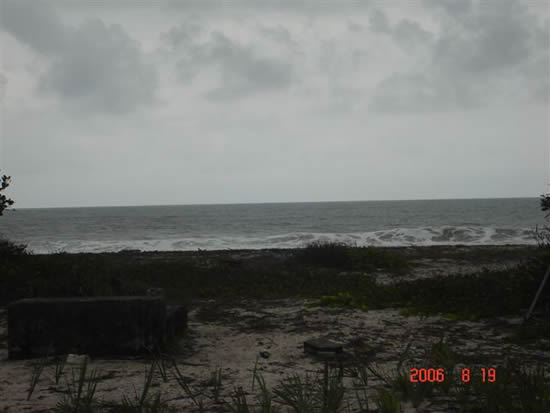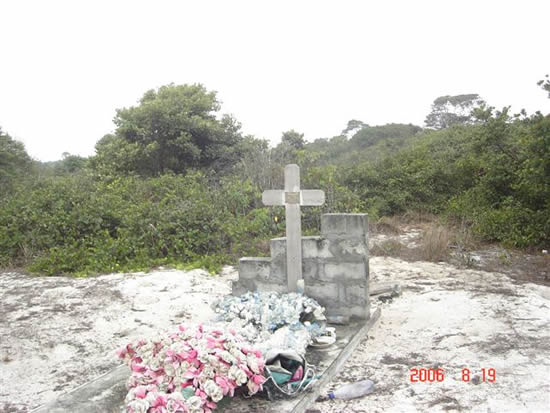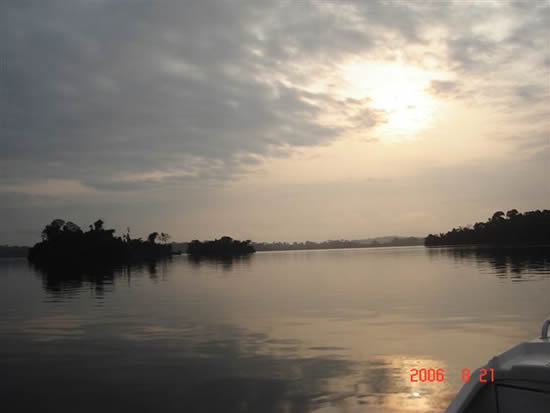Gabon birds
by Barbara on Jun.05, 2009, under Unpublished Writing
I walk into a large shopping mall in Johannesburg. Will I remember where I have parked my car I wonder? The place is a honeycomb, a thousand cars parked in the underground parking garage, dark, night in the sunlight. I catch an escalator downwards, past the banks, past the medical doctors, past the picture galleries and cosmetic counters, past and down, into the maw of the mall.
Near a furniture shop that sells wooden tables made of whole trees, I hear a telephone ring. It is loud, incessant, no-one answers it. It does not sound like one of the thousands of mobile phones that are held to ears, for they are answered quickly, people in malls always take their calls, connected, identified, urgent. The sound emanates from the entrance to a shop, an incongruous shop for a city mall. And then I hear words, not the voice of a human, but a non human bird “pretty parrot, pretty parrot, I watch television and drink beer, I watch television and drink beer. I’m the guy for a braai.” I look towards the sound, inside the window of the shop is a large steel cage, and in it is an African Grey parrot. Its beak is sharp, for it has little to blunt it with except the wooden bar on which it perches, its wings tipped in red fold over its body, they are undersized. I stop and wander backwards to a place and a time, a place and a time of low hung ancient grey clouds and thick immersed humidity; a place where birds have wings and fly.
We catch a light aeroplane from Libreville, the capital city of Gabon to Loanga National Park. Gabon is difficult to get around unless you are in Libreville where the red and white taxis fly past you at any hour, day and night. The honk and slow down, “do you want a ride” the human voice declares. There are few roads to the different towns or parks, and where there are roads every rainy season, when the wet waters rise some 3000 millimetres, they shatter to potholes.
We take the plane to Port Gentil, the oil capital of the country; Elf and Caltex have built up the sea shore, made it habitable, rolled it in money . The aeroplane lands lightly on the runway, it is durable, the rains do not destroy it, rain respects oil barons, direct access to possessions. Just beyond the shoreline the oil rigs work their machinery, pumping the viscous black liquid gold, the liquid dollars and euros, upwards. Along the shore the houses are white and newly painted; there is no sign of a water stain on the long walls, they are clean. And then we take off to Gamba. The flight takes 45 minutes, it is not very far away, and yet to drive the road between Gamba and Port Gentil, the distance between the two towns being 400 kilometres, takes two days. A red and white taxi takes us from the airport to the quay, and yet it is not a quay, it is just a boat on the edge of the N’dogo Lake, an inland stretch of water, that runs alongside the rich Atlantic coastline. The boat will take us to Setta Cama, the southern most part of the park. For an hour we race along the water at a high speed, the foam behind the boat flies upwards to meet the low slung clouds. It is hot, the wind burns a bare shoulder, there is no sun, it hides. Islands of trees flash past as we ride, towering trees, 60 metres high. Birds alight on top of the summit most branches and wave to us as we pass. They shout words of welcome; they receive us into the world of the gods.

Setta Cama, the place of the seven graves, is a village, and just beside it there is a small lodge. It has wooden rooms that are bare and clean. We follow the pieces of tree trunk that have been placed on the earth to make a pathway, thick wood prevent the sea sand from getting into my shoes, a table on the sand. Immediately I get to the room I drop my bags and walk down to the ocean. Loanga is set between the lake and the ocean. A thin wedge of land divides the two waters. On one side a fresh water lake, N’dogo, that is the home to the trees and the islands of birds; on the other side the pounding surf, simple pale shells, crabs that run crazily on the white sand. The wind blows off the sea water, I lick my lips, it is salty. I sit and stare at the stateliness around me.
After a while I walk inland, into the thin stretch of space between the lake and the sea. In front of me I notice a grave; another is near by. The marble head stones are nature weathered and grey, textured. I lean down and clean the sand from the words that are engraved on a marble slab, “Henri Lemercieur. Rest in peace; your life was as long as it was productive. 1818 to 1876. Military governor of the coast line.” Next to it is a smaller grave, it has no head stone. Beside it there is a glass; a plate. Food for the dead and a Christian cross, a bottle of a medicine, health care for an ancestor. I walk further, there are more graves. “Frederick Rhead. Liverpool. 10 July 1895. 31 years old”, and “W M Robert Sheraton. Bristol. 18 August, 1834. 46 years old”, and “Katherine Jane Rhead. 1891. 3 years old.” Setta Cama, the place of the seven graves.

Setta Cama was a trading post in the 19th century. As the continent was divided up between the European powers the English would come to this coastline and trade in wood and ivory. There was a need to light fires in cold unelectrified Europe; and there was a need for ivory that grew from the forest elephant to decorate the pale arms of a duchess. But it was a harsh country, the mosquitos sucked blood, which in turn caused malaria, the climate was not conducive to the consumptive lungs of a European, hot and humid. People died young on this coast line, as young as 3 years. And then the French were given the land. Where were the local inhabitants? They walked the forests and hid under the canopied trees. And as it is both necessary and important to rule over a land, to make laws that validate the existence of a society, laws that will be obeyed, governors were appointed. And so these men came to Africa, bringing with them their families and possessions. And they too died and were buried, next to a plate of food for the ancestors and a cross for Jesus.
I sit on the weathered tombstone of W M Robert Sheraton from Bristol and wonder what he thought of as he died in the close sticky air. I look upwards towards the sky; there is a cacophony of sounds, suddenly a flock of birds’ flies by. They are shrieking in a language that I do not understand, they are playing with the cooling clouds. Several of them alight on a tree; they are far above the ground, the others fly off, down and across the lake. They have an arrangement for a tea party and want to eat the seeds that lie atop the thin trunked ceiba tree that look, to my unfamiliar mind, like a baobab, the same flowering outwards of the branches. I hold my binoculars to my face and watch the birds that have alighted above the grave. They shriek, they shout greetings and banter with each other. Suddenly they come into the binocular vision, twenty, thirty grey parrots in an equatorial tree in Gabon. An African Grey parrot that has wings, they fly; they speak a language, they are birds that have not forgotten that they are gods.

I get up and follow the ocean waves. In a magazine that I recently read there is an article written about the hippos that come from the lake to the sea to surf. They drag their surfboards across the graves and the sand and surf in the white stained waves. I wonder if today they have taken a break, it is after all a week day, a work day, a day in which leisure is condemned. In the distance, on the waters edge, I think that I see the ponderous outline of a hippo, a hippo that shows contempt for Lemercieur’s rules, flagrantly disrespectful of this work ethic. It moves its four legs forward towards the waves, enters the water and catches the crest.
I watch the lonely African Grey parrot in the window of the pet shop in the mall; ‘pet’ even the word is pejorative, domesticated, and wonder if this bird is able to remember that it is a god?
The bright neon lights of the mall illuminate this void. The sun shines outside in the Johannesburg summer, but god can no longer be found in the world of natural day light. For an educated city person this belief of god is a childish superstition, a cognitive error that has been overcome by an advanced understanding of the world. Human maturity requires that we live in this clear invigorating light of neon, neon knowledge. And yet I know that there is something more, god is not dead, god is not non existent. But we catch our gods and clip their wings, we place them in cages and we teach them to parrot our language. A violent act against the gods that glide over the Loanga sea board and the cobalt waters of the lake, but also against ourselves. We can no longer smell delight in peppery sultry air.